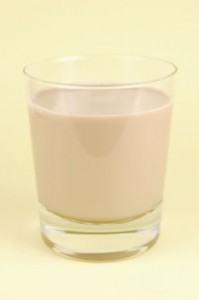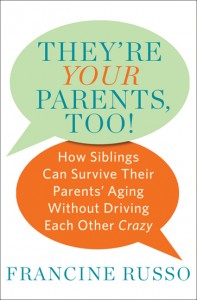Individuals who report having greater purpose in their lives appear less likely to develop Alzheimer’s disease or its precursor, mild cognitive impairment, according to a report in the March issue of Archives of General Psychiatry, one of the JAMA/Archives journals. [continue reading…]
Alzheimers
I was recently invited to review They’re Your Parents, Too!: How Siblings Can Survive Their Parents’ Aging Without Driving Each Other Crazy
by former Time magazine boomer beat reporter Francine Russo.
Color me CRAZY!
I’ve traveled down this road, and reading Francine’s book brought back some all too familiar scenarios from one of the darkest chapters of my life following the death of my mother, and my fathers subsequent decline into dementia.
My own family dynamics were riddled with anger, past resentments, criticism and guilt. I had not experienced a good relationship with my brothers for the 20 years prior to my mothers death, and shared little to no contact with them. I was the child who was “far away” and subsequently faced 4 brothers who refused to share information (with regard to my father) about health, finances, or indeed anything.
Francine’s book greatly helped me to make sense of the psychological dynamics, demands and consequences .
This was a time that exposed past untold stories and a range of very difficult emotions for me. Much of what occurred in my own family was inevitable.
My relationship with my siblings was not worth mending, and I have been able to accept this and move on.
Will you and your siblings be able to reach an understanding and work together, or will the challenges you face tear you apart? They’re Your Parents Too is an indispensable guide for anyone whose parents are aging. N
Francine Russo’s book is filled with expert guidance from gerontologists, family, therapists, elder-care-attorneys, financial planners and health workers. She recounts engaging, helpful stories of sisters and brothers who struggled to find their way through this family challenge as their parents age.
This is a must have book/manual for anyone who is a caregiver for someone who is aging, professionals who are working with families of the elderly and anyone who wants to repair their relationships with their siblings— I highly recommend it. 😀 – Kathy
A milkshake that promises to boost the memory of Alzheimer’s patients could be available within two years.
 Souvenaid is a multi-nutrient drink designed to improve cognitive function and is the result of more than ten years of research and development into the potential role of medical nutrition in neurological diseases. The first clinical trial took place between 2006 and 2008. The results of this trial,demonstrating proof of concept, are being published in the January 2010 issue of the peer-reviewed journal Alzheimer’s & Dementia.
Souvenaid is a multi-nutrient drink designed to improve cognitive function and is the result of more than ten years of research and development into the potential role of medical nutrition in neurological diseases. The first clinical trial took place between 2006 and 2008. The results of this trial,demonstrating proof of concept, are being published in the January 2010 issue of the peer-reviewed journal Alzheimer’s & Dementia.
One of the features of a brain with Alzheimer’s disease is the loss of synapses, which are junctions between two neurons or between a neuron and a muscle. Research suggests some connection between low numbers of synapses in a person’s brain and Alzheimer’s symptoms such as memory impairment and language deterioration.
Souvenaid® is a once-a-day nutritional drink designed to build nerve connections in the brain linked to memory function. Souvenaid® was shown in a clinical trial to improve memory in patients in the early stages of Alzheimer’s Disease. Souvenaid® contains Fortasyn™ Connect, a patented combination of nutrients that interact to help build brain synapses.
Source: Nutricia

A new type of brain scan, called diffusion tensor imaging (DTI), appears to be better at detecting whether a person with memory loss might have brain changes of Alzheimer’s disease, according to a new study published in the January 6, 2010, online issue of Neurology®, the medical journal of the American Academy of Neurology.
“As better medicines for Alzheimer’s disease become available, it will be important to identify people at high risk for the disease as early and accurately as possible so treatment can be most effective,” said Norbert Schuff, PhD, with the University of California and the Veterans Affairs Medical Center, San Francisco, author of an editorial about the research. [continue reading…]

